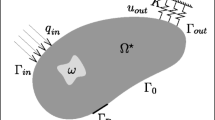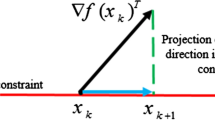Abstract
In this work, a density-based method is applied for synthesizing compliant mechanisms using topology optimization. This kind of mechanisms uses the elastic strain as the basis for kinematic actuation and it is widely used in precision mechanical devices, in biomedical engineering, and recently in MicroElectroMechanical Systems (MEMS). Geometrical and material (compressible hyperelasticity) nonlinearities are taken into account to obtain mechanisms near real-world applications. A strength criterion for the optimization problem is applied, to design compliant mechanisms that fulfill the desired kinematic tasks while complying with a stress threshold. The addition of a stress constraint to the formulation also aims to alleviate the appearance of hinges in the optimized design. Employing benchmark examples, we investigate the influence of a nonlinear formulation with a stress constraint in the final designs. It is shown that material nonlinearity plays an important role for stress constraint problems. The use of a projection scheme helps to obtain optimized topologies with a high level of discreteness. The Method of Moving Asymptotes (MMA) is applied for design variables updating and the required derivatives are calculated analytically by the adjoint method.













Similar content being viewed by others
References
Atkins RJ, Fox N (2005) An introduction to the theory of elasticity. Dover Publications Inc.
Ball JM (1977) Convexity conditions and existence theorems in nonlinear elasticity. Arch Ration Mech Anal 4:337–403
Bathe KJ (2010) Finite Element Procedures. Prentice Hall Ltd.
Belytschko T, Liu WK, Moran B, Elkhodary KL (2014) Nonlinear Finite Elements for Continua and Structures. Wiley
Bendsøe MP, Sigmund O (1999) Material interpolation schemes in topology optimization. Arch Appl Mech 69:635–654
Bendsøe MP, Sigmund O (2003) Topology optimization - theory, methods and applications. Springer
Bourdin B (2001) Filters in topology optimization. Int J Numer Methods Eng 50:2143–2158
Bruggi M (2008) On an alternative approach to stress constraints relaxation in topology optimization. Struct Multidiscip Optim 36:125–141. https://doi.org/10.1007/s00158-007-0203-6
Bruns TE, Sigmund O (2004) Towards the topology design of mechanisms that exhibit snap-through behavior. Comput Method Appl Mech Eng 193:3973–4000
Bruns TE, Tortorelli DA (2001) Topology optimization of non-linear elastic structures and compliant mechanisms. Comput Methods Appl Mech Eng 190:3443–3459
Bruns TE, Tortorelli DA (2003) An element removal and reintroduction strategy for the topology optimization of structures and compliant mechanisms. Int J Numer Methods Eng 57:1413–1430
Buhl TB, Pedersen BW, Sigmund O (2000) Stiffness design of geometrically nonlinear structures using topology optimization. Struct Multidiscip Optim 19:93–104
Cheng G, Jiang Z (1992) Study on topology optimization with stress constraints. Eng Optim 20:129–148. https://doi.org/10.1080/03052159208941276
Cheng GD, Guo X (1997) Epsilon-relaxed approach in structural topology optimization. Struct Multidiscip Optim 13:258–266
Cook RF (2006) Strength and sharp contact fracture of silicon. J Mater Sci 41:841–872
Crisfield MA (1996) Non-linear finite element analysis of solids and structures, vol 1. Wiley
Curnier A (1994) Computational methods in solid mechanics. Kluver Academic
Da Silva G, Beck A, Sigmund O (2019) Stress-constrained topology optimization considering uniform manufacturing uncertainties. Computer Methods in Applied Mechanics and Engineering. https://doi.org/10.1016/j.cma.2018.10.020
De Leon DM, Alexandersen J, Fonseca JSO, Sigmund O (2015) Stress-constrained topology optimization for compliant mechanism design. Structural and Multidisciplinary Optimization. https://doi.org/10.1007/s00158-015-1279-z
Deng H, Cheng L, To A (2019) Distortion energy-based topology optimization design of hyperelastic materials. Structural and Multidisciplinary Optimization. https://doi.org/10.1007/s00158-018-2161-6
Díaz A, Sigmund O (1995) Checkerboard patterns in layout optimization. Struct Multidiscip Optim 10:40–45
Duysinx P, Bendsøe MP (1998) Topology optimization of continuum structures with local stress constraints. Int J Numer Methods Eng 43:1453–1478
Duysinx P, Sigmund O (1998) New developments in handling stress constraints in optimal material distribution. AIAA J 4906:1501–1509
Guest J, Asadpoure A, Ha SH (2011) Eliminating beta-continuation from heaviside projection and density filter algorithms. Struct Multidiscip Optim 44:443–453. https://doi.org/10.1007/s00158-011-0676-1
Guest JK, Prévost JH, Belytschko T (2004) Achieving minimum length scale in topology optimization using nodal design variable and projection functions. Int J Numer Methods Eng 61:238–254. https://doi.org/10.1002/nme.1064
Holzapfel GA (2000) Nonlinear solid mechanics, a continuum approach for engineering. Wiley
Howell LL (2012) Compliant mechanisms. In: McCarthy J M (ed) 21st century kinematics. chap 7. Springer, pp 189–216
Kirsch I (1990) On singular topologies in optimum structural design. Struct Optim 2:133–142
Klarbring A, Strömberg N (2013) Topology optimization of hyperelastic bodies including non-zero prescribed displacements. Struct Multidiscip Optim 47:37–48. https://doi.org/10.1007/s00158-012-0819-z
Lahuerta RD, Simoes ET, Campello EMB, Pimenta PM, Silva ECN (2013) Towards the stabilization of the low density elements in topology optimization with large deformation. Comput Mech 52:779–797. https://doi.org/10.1007/s00466-013-0843-x
Le C, Norato J, Bruns TE, Ha C, Tortorelli DA (2010) Stress-based topology optimization for continua. Struct Multidiscip Optim 41:605–620
Lee E, Gea HC (2014) A strain based topology optimization method for compliant mechanism design. Struct Multidiscip Optim 49:199–207. https://doi.org/10.1007/s00158-013-0971-0
Liu L, Xing J, Yang Q, Luo Y (2017) Design of large-displacement compliant mechanisms by topology optimization incorporating modified additive hyperelasticity technique. Math Probl Eng 2017:1–11. https://doi.org/10.1155/2017/4679746
Lopes CG, Novotny AA (2016) Topology design of compliant mechanisms with stress constraints based on the topological derivative concept. Struct Multidiscip Optim 54:737–746. https://doi.org/10.1007/s00158-016-1436-z
Luo J, Luo Z, Chen S, Tong L, Wang MY (2008) A new level-set method for systematic design of hinge-free compliant mechanisms. Comput Methods Appl Mech Eng 198:318–331
Moon S, Yoon G (2013) A newly developed qp-relaxation method for element connectivity parameterization to achieve stress-based topology optimization for geometrically nonlinear structures. Computer Methods in Applied Mechanics and Engineering. https://doi.org/10.1016/j.cma.2013.07.001
Pedersen CBW, Buhl T, Sigmund O (2001) Topology synthesis of large-displacement compliant mechanisms. Int J Numer Methods Eng 50:2683–2705
Pereira A d A, Cardoso EL (2018) On the influence of local and global stress constraint and filtering radius on the design of hinge-free compliant mechanisms. Struct Multidiscip Optim 58:641–655. https://doi.org/10.1007/s00158-018-1915-5
Pereira JT, Fancello EA, Barcellos CS (2004) Topology optimization of continuum structures with material failure constraints. Struct Multidiscip Optim 26:50–66. https://doi.org/10.1007/s00158-003-0301-z
Sigmund O (1997) On the design of compliant mechanisms using topolgy optimization. Mech Based Des Struct Mach 25:493–524
Sigmund O (2007) Morphology-based black and white filter for topology optimization. Struct Multidiscip Optim 33:401–424. https://doi.org/10.1007/s00158-006-0087-x
Sigmund O, Petersson J (1998) Numerical instabilities in topology optimization: a survey on procedures dealing with checkerboards, mesh-dependencies and local minima. Struct Optim 16:68–75
Svanberg K (2002) A class of globally convergent optimization methods based on conservative convex separable approximations. SIAM J Optim 12:555–573
Svärd H (2015) Interior value extrapolation: a new method for stress evaluation during topology optimization. Struct Multidiscip Optim 51:613–629. https://doi.org/10.1007/s00158-014-1171-2
Takezawa A, Nishiwaki S, Kitamura M (2010) Shape and topology optimization based on the phase field method and sensitivity analysis. J Comput Phys 229:2697–2718. https://doi.org/10.1016/j.jcp.2009.12.017
Wang MY (2009) Mechanical and geometric advantages in compliant mechanism optimization. Front Mech Eng China 4:229– 241
Wang F, Lazarov BS, Sigmund O (2011) On projection methods, convergence and robust formulations in topology optimization. Struct Multidiscip Optim 43:767–784. https://doi.org/10.1007/s00158-010-0602-y
Wang F, Lazarov BS, Sigmund O, Jensen JS (2014) Interpolation scheme for fictitious domain techniques and topology optimization of finite strain elastic problems. Comput Methods Appl Mech Eng 276:453–472. https://doi.org/10.1016/j.cma.2014.03.021
Wriggers P (2008) Nonlinear finite element method. Springer
Zhou M, Sigmund O (2017) On fully stressed design and p-norm measures in structural optimization. Struct Multidiscip Optim 56:731–736. https://doi.org/10.1007/s00158-017-1731-3
Zhou M, Lazarov B, Wang F, Sigmund O (2015), Minimum length scale in topology optimization by geometric constraints. Computer Methods in Applied Mechanics and Engineering. https://doi.org/10.1016/j.cma.2015.05.003
Zhu B, Xianmin Z, Fatikow S (2014) A multi-objective method of hinge-free compliant mechanism optimization. Struct Multidiscip Optim 49:431–440. https://doi.org/10.1007/s00158-013-1003-9
Acknowledgments
The authors would like to thanks Prof. Jun Sergio Ono Fonseca (in memoriam) for the initial idea. Also we would like to acknowledge Niels Aage, from the Technical University of Denmark, for a C version of MMA.
Funding
This research was partially supported by the Brazilian National Council for Scientific and Technological Development (CNPq). J. F. Gonçalves received support from the RCGI (Research Centre for Gas Innovation) hosted by the University of São Paulo (USP) and sponsored by FAPESP (São Paulo Research Fundation (2014/50279-4)) and Shell Brasil.
Author information
Authors and Affiliations
Corresponding author
Ethics declarations
Conflict of interest
The authors declare that there is no conflict of interest.
Additional information
Responsible Editor: Ole Sigmund
Publisher’s note
Springer Nature remains neutral with regard to jurisdictional claims in published maps and institutional affiliations.
Replication of results
All necessary data to reproduce results presented in this paper are described in the results section. Derivatives necessary to replicate optimized topologies are developed in the sensitivity analysis subsection. Methods applied to perform equilibrium equations for the FEM analysis are available in the cited literature.
Rights and permissions
About this article
Cite this article
De Leon, D.M., Gonçalves, J.F. & de Souza, C.E. Stress-based topology optimization of compliant mechanisms design using geometrical and material nonlinearities. Struct Multidisc Optim 62, 231–248 (2020). https://doi.org/10.1007/s00158-019-02484-4
Received:
Revised:
Accepted:
Published:
Issue Date:
DOI: https://doi.org/10.1007/s00158-019-02484-4




